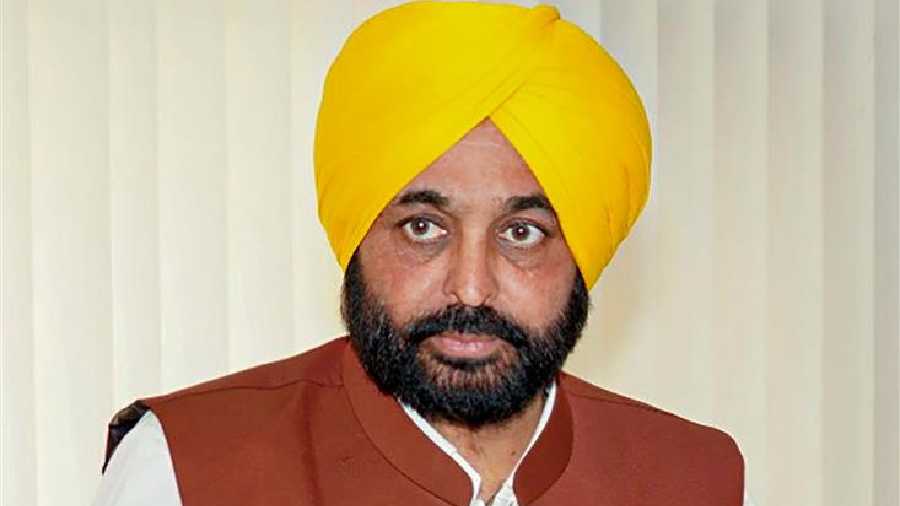The Supreme Court on Tuesday pulled up Punjab’s governor and chief minister over their bitter political slugfest, saying a “constitutional dialogue between constitutional functionaries” should reflect “decorum and mature statesmanship”.
A bench headed by Chief Justice D.Y. Chandrachud said governor Banwarilal Purohit was bound under the Constitution to convene the Assembly session as sought by the state cabinet, and that chief minister Bhagwant Singh Mann could not decline to furnish information sought by the governor.
“Public trust is intended to subserve the citizens so that the affairs of the nation are taken care of so as to achieve the objects of the Preamble to the Constitution,” Justice Chandrachud said.
“While this court is cognisant of free speech and expression, constitutional discourse has to be conducted with a sense of decorum and mature statesmanship, particularly in the context of constitutional dialogue between constitutional functionaries.
“Political differences in a democratic polity are acceptable and have to be worked out with sobriety. Unless these principles were borne in mind, the effective implementation of constitutional values is liable to be placed in jeopardy.”
Punjab’s Aam Aadmi Party government had petitioned the apex court challenging Purohit’s refusal to convene the budget session of the Assembly.
The special bench, which included Justice P.S. Narasimha, disposed of the petition after solicitor-general Tushar Mehta, appearing for the governor, informed the court about Purohit’s decision to convene the House as scheduled on March 3.
The row had erupted after the governor, in a February 13 letter to the chief minister, questioned the state government about the criteria adopted to send a delegation of school principals to Singapore for training.
Mann had hit back the next day, saying he was not under any obligation to give an explanation to the governor and that his government was answerable only to the three crore people who had elected it. He also posted a tweet on the subject.
When Mann later requested the governor to convene the budget session on March 3, Purohit declined. He said he was seeking legal opinion on the chief minister’s refusal to reply to his question and on the “derogatory remarks” made against him in his letter and tweets. This prompted the state government petition.
The special bench assembled at 3.30pm following a request from senior advocate A.M. Singhvi, who appeared for Mann, for urgent hearing.
Singhvi argued that the governor had acted in ignorance of the Constitution.
Mehta, referring to Mann’s February 14 letter, said: “The language used by the chief minister and the level of discourse --- we have to look at this. This is a letter, on the letterhead of the chief minister, sent to the governor -- and look at the discourse.
“They (the AAP government) say they are answerable to three crore Punjabis. So, they are not answerable to anyone else. Not even to your lordships, if that logic is applied.”
Justice Chandrachud then told Singhvi that under Article 167(B), when the governor seeks information the chief minister is “duty bound to furnish” it to him.
“Ask one of your (chief minister’s) secretaries to respond. At the same time, Mr Solicitor-General, once the cabinet says (so), the budget session has to be convened; he (the governor) is duty bound,” Justice Chandrachud said.
“We may belong to different political parties but the office of the governor is not from a party. We have to have a constitutional discourse.”
Justice Narasimha observed: “From both sides there is a dereliction of duty, despite both of them being holders of constitutional posts.”
The bench decided to dispose of the matter without any specific directions after Mehta placed on record a communication issued by the governor convening the Assembly session at 10.30am on March 3.
In its written order, the court said the chief minister had a duty to communicate with the governor and to furnish information concerning the administration of the state as the governor required.
It referred to a judgment by a seven-judge constitution bench in Shamsher Singh vs State of Punjab (1974) that said the governor must act only on the aid and advice of the council of ministers. This was subsequently reiterated by a five-judge bench in Nabam Rebia vs Deputy Speaker (2016).
“In view of the clear constitutional provision there can be no doubt that the authority entrusted to the governor to summon the House is to be exercised on the aid and advice of the council of ministers,” the apex court said.
“This is not a constitutional power where the governor can exercise his own discretion…. However, the governor adverted to the tweet of the chief minister and the letter dated 14 Feb.
“He then stated that since both the tweet and letter were unconstitutional and derogatory… he would have to take legal advice.
“The tone and tenor of the letter written by the chief minister left much to be desired. Not furnishing the information would be against his constitutional duty. Yet on the other hand, the dereliction of the chief minister to do so would not allow the governor to not do his constitutional duty to summon (the) budget session.
“Failure of constitutional authority to fulfil its duty would not be a justification for another to fulfil his distinct duty under the Constitution.”










